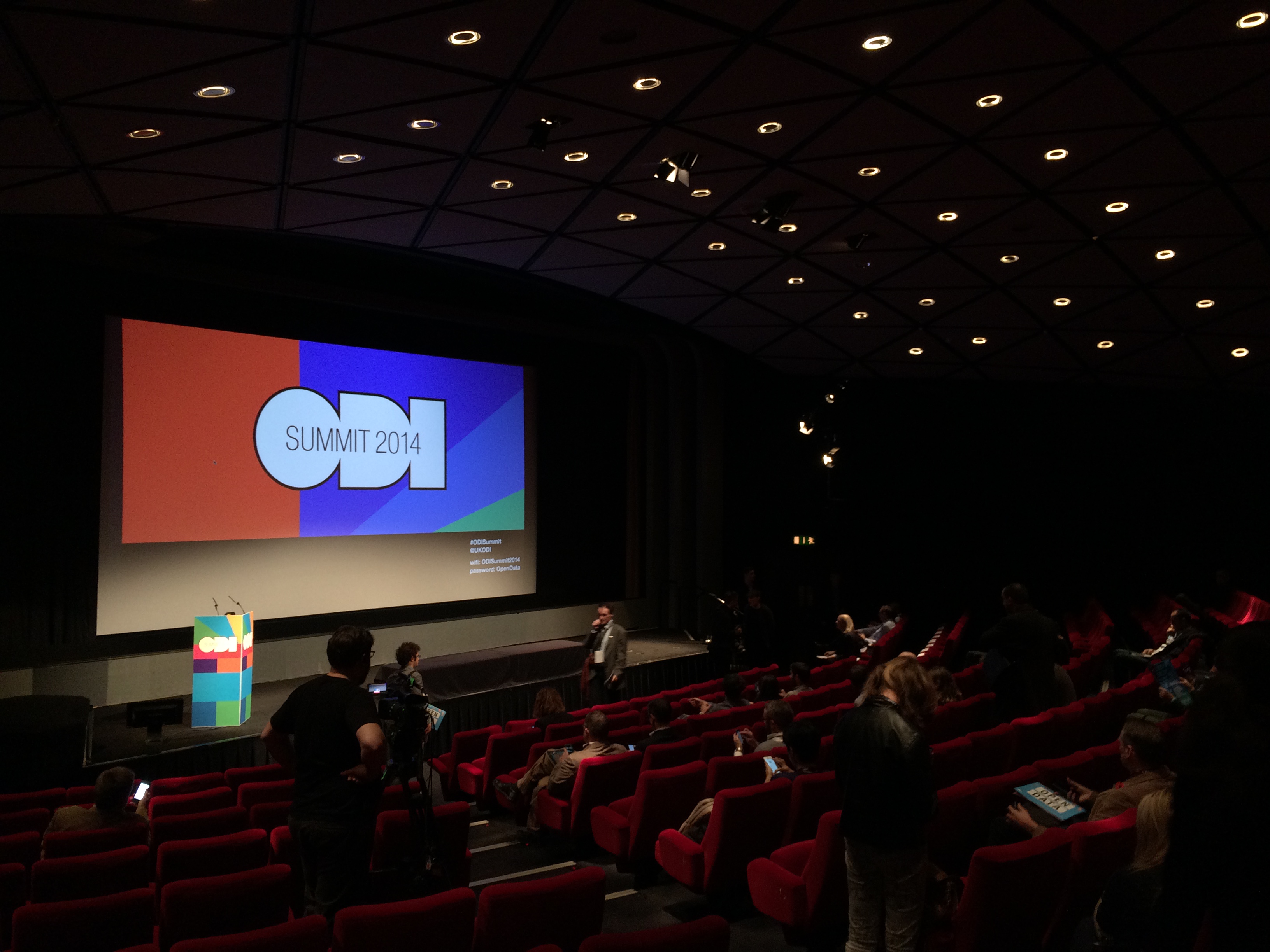Refelcting on the #ODISummit

Over the last two days I’ve been in London getting my head around the Open Data community at the Open Data institute’s second Open Data Summit.(#odisummit)
I’m involved in an InnovateUK/Nesta funded project that’s looking at open data ecosystems that you need for open data to emerge and thrive, especially at a local level.
The summit was a great chance to do a bit of anthropology – to get among the open data people and see just who they were. And, if the delegates at the Summit were anything to go by, what a diverse bunch they are!
The Monday was set as a training and discovery day. Training is one of the core parts of the ODI’s business; In just under two years they say they’ve trained nearly 700 people. So it was interesting to see this as a more official part of the summit. The subjects were pretty diverse from Law to how to bring up open data at parties – no really!
It was really useful for me , not just because I learnt a lot of new things e.g. open licensing is deceptively complex. It also helped me get a feel for the balancing act that seems to be a constant part of the open data community.
Open and Data
The crowd seemed to split for me between ‘open’ people and* ‘data’* people. A lot of people were in the room motivated by openness. The power of transparency to do things better. That was often a strong ideological view, but there was also a clear commercial element here which I could best sum up as a passion for open innovation. The ‘data’ people in the room highlighted the technological and process bias; learning how to sift 6gb of data in 6 seconds or introducing a more structured, scientific approach to visualization. Of course it wasn’t mutually exclusive. A lot of people worked the space in between.
The extent of thatliminal space really showed itself in the second day as we decamped to the British Film institute for the summit proper.
Reaching the data Summit
The day was bookended by a call to arms from the ODI founders. First Tim Berners Lee – cue lots of tech-crowd swooning – who thinks the argument for releasing data is at the same stage as the early web when it comes to the argument of what you put on the web. He commented that it was “a syndrome of progressive, competitive, disclosure” that forced websites to offer their users more and open data will do the same. ** **
25 Years of the World Wide Web from Open Data Institute on Vimeo.
The other ‘end’ went to Nigel Shadbolt who sent the crowd away with ‘a data can save the world message’ underpinned by two common themes for data – Health (and it’s current poster germ ebola), healthcare.
Closing keynote: Sir Nigel Shadbolt from Open Data Institute on Vimeo.
The spaces in between were filled with government and private companies with good stories to tell around opening up and using data and a few tasty funding announcements (EU open data and heritage and culture). This seemed to be the general tone of the event – shiny happy data stories – as ODI CEO Gavin Starks said “the odi brings color to data”
One notable exception from the parade of open data case studies and lightening talks, was an onstage interview by Martha Lane Fox with Manchester teenager and EU Digital Girl of the year Amy Mather. It’s a testimony to the the attitudes that pervade in tech that the thing’s Amy said are seen as fresh and challenging . Amy was as much an example of the value of critical approaches to tech as tech itself and the interview is well worth a watch.
My reflections
It was a really useful two days for me a few points struck me:
Open data (and the ODI) walks a really fine line between ideological and commercial concerns. That seems like a really tricky balance to get especially if you stress the ‘good’ that open data can do and ally yourself to the broader open government agendas. The ODI’s take seems to be to ‘nudge’. Just one open data set from a company or stakeholder is a good thing. Nudging is great but, as one speaker noted, the open data industry needs radical innovation not small steps.
A lot of open data business relies on the work of others. There seem to be a lot of open data businesses complaining that they can’t succeed because someone else needs to produce data. Shadbolt’s final talk referenced a number of healthcare comparison sites from the US seemingly bemoaning that fact that we could have this if only we had the data! Somehow not being open is anti-competitive. I can see the business case in that (it’s a supply chain issue). Some speakers from government actively recognized and embraced this – Government’s Digital Director Mike Bracken noted that he saw his job as doing the hard work for others. But the this reliance on external sources does make me wonder about the long-term robustness and viability of this space if it’s core business is built on the expectation that others will give them raw material, and I could add for free here but…
Free is one of the most divisive words in open data: Just ask a room full of open data people what free means and see what I mean.
Open data often confuses process with impact: Will Perrin from Openly local had a combative view on the focus on technical standards and the idea that open data is defined by it’s delivery method rather than it’s utility for users – especially when when put against the ‘it makes the world better for people’ claim. He said: “Putting an API on open government data is fundamentally undemocratic”. He asked delegates not to think of data first but bring the problem that data could solve. In that respect open data is a lot of people with hammers looking for nails. In a similar context I also noticed that the phrases customer and citizen were interchangeable (even Will did it). Just words but (like fee) very loaded ones that need careful consideration.
The Open data community is like the foreign aid community: Some of the best, simplest examples of open data I saw came from working with (developing) countries developing open government. It’s easy to see how the combination of technology, transparency and engagement works across the boundaries. Its a seductive and satisfying justification for open data advocates. But once there is an open data capacity there, it seems some very ‘first world’ problems creep in (and a fair share of consultants). If the ‘doing good doing open data ‘ rhetoric is going to have value then, for me, the question of how open data activities manage the transformation from an ‘aid’ model to ‘opening up markets’ model strikes me as a key part in it growing up.
All in all it was valuable and entertaining few days. I really enjoyed it but didn’t get a clear sense of who the community was. Maybe that’s not the point. There was clearly strength in that diversity and one that makes open data really interesting and engaging.
Here’s a list of the ODI’s output from the days:
- Summit video: bit.ly/odisummit_video
- videos: bit.ly/odi_vimeo
- photos: bit.ly/odi_flickr
- audio: bit.ly/odi_soundcloud
- slides: bit.ly/odi_scribd
- tweets: bit.ly/odi_tweets
Full disclosure: I got a rather nice t-shirt, lots of nice stickers and had some nice food and beer at the two days. Thanks ODI!

